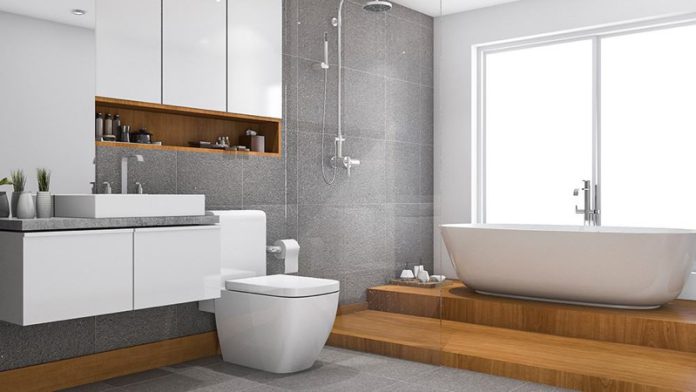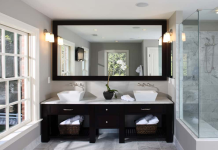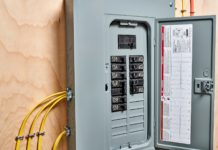It’s Wednesday night, and you’re running a bath after a long and busy day. You run the warm water, throw in some bubbles and scented candles and grab a glass of red wine for a relaxing soak.
In the middle of your bath, you feel a chill. You haven’t fully enjoyed this home spa treatment yet, but you feel you have to cut it short or catch a cold.
This signals a need to invest in a good bathroom heater. On Sleek Dwellings, they give you great advice on which appliance to invest in to make your situation better.
So without further ado, let’s find out what kind of bathroom heater is best for you.
What is a Bathroom Heater?
Comfort is a must in our daily life.
Bathroom heaters are heating appliances that give you that toasty feeling in the washroom during low temperatures without crushing up your central heating system. Other than keeping you warm, it offers benefits such as:
Steam Control
After we step out of a hot shower, steam accumulates on mirrors, surfaces, and other bathroom appliances. Steam builds moisture, and too much can put you at risk of fall-related injuries.
Moisture Control
As much as possible, we want to keep our bathroom dry. Too much moisture equals bacteria and fungi growth. This also speeds up the deterioration of our bathroom fixtures, which may cause you to break the bank earlier than you may want to on repairs or replacements.
Health
Heaters aid in pain alleviation, whether it’s an exercise-related pain and discomfort or achy muscles and joints brought on by chronic conditions. Not to mention, it helps in cardiovascular circulation.
What Makes a Bathroom Heater Good?
Suffice to say; not all bathroom heaters are created equal. When choosing the right heater for your needs, consider the following factors:
Durability
Being a wise buyer means choosing a heater model that can serve you well for years.
Durable heaters require minimal maintenance and are built with quality materials to keep you from experiencing the unwanted stress of having to purchase a new one now and then.
Heating Efficiency
We don’t spend a lot of time in the bathroom. Sometimes, we just need to take a quick shower and get ready for work; other times, we need a long relaxing bath to soak the stress away.
Either way, we need a heater that toasts the bathroom quickly. By checking the wattage output and British Thermal Units (BTUs), you can find this out. The higher BTU, the more efficient the heater.
Safety Features
A bathroom heater is an electrical appliance. Since it is in a wet and humid environment, the chances of short circuits and other electrical accidents can shoot up if you’re not careful. A bathroom heater should be equipped with high-quality materials to prevent this.
Pro-tip: Look out for an automatic overheat protection feature.
Quietness
If you don’t want mosquito-like sounds close to your ears, choose a heater that doesn’t buzz when you’re in the bathroom. Sounds in bathrooms tend to reverberate, so a silent heater is a must for convenience and relaxation.
Size
When it comes to heaters, size matters; measure the dimensions of your bathroom before you ‘add to cart.’ Small heaters aren’t likely to warm large spaces effectively. Similarly, large heaters aren’t the practical and economical choice for smaller bathrooms.
Making the wrong choice in this regard will most definitely reflect on your electric bill.
Pro-tip: 10 watts of power per square foot is a good choice.
Heater Types
Bathroom heater features are also tied to their ‘type,’ of which the most common are:
Portable Heaters
Portable heaters are small heater units that you can carry around. If you’re a renter, this might be a good choice. You can also use this heater in different rooms as you require. One thing to watch out for when using this in the bathroom is placement—keep it far from the water’s reach.
Portable heaters come in three types:
- Ceramic heaters which, as its name suggests, use ceramic plates
- Fan heaters that use electric coils
- Oil heaters that use an internal oil heating system
Ceiling Heaters
Ceiling heaters are mounted high, so they are probably one of the safest and most convenient of the bunch.
They require a direct connection to your home’s electrical panel and, thus, may need professional installation. These are portable enough to be taken out and installed somewhere else on the plus side.
Ceiling heaters provide a long-lasting solution to your bathroom-heating woes, which typically revolve around lighting. They come either with or without built-in lighting fixtures.
Wall Heaters
A permanent solution to your cold-bathroom problem is a wall heater, as it is installed well… on a wall. Like ceiling heaters, wall heaters might require you to hire a professional to install the unit.
These heaters come in two types:
- Wall-mounted heaters: mounted on the wall and plugged into an electrical outlet.
- In-wall heaters are mounted inside the wall panel and have electrical wires connecting to the house electrical panel. Besides the nitty-gritty electrical setup, it’s efficient, durable, and budget-friendly.
There you have it! We’ve just gone over the basics of bathroom heating. We hope it was enough to clue you in on the safest and most ideal bathroom heaters for your home.
As consumers, we owe it to ourselves to be well-informed about the products we shop for. In particular, we must choose products that rank high in terms of safety features and features that align with our specific needs.















